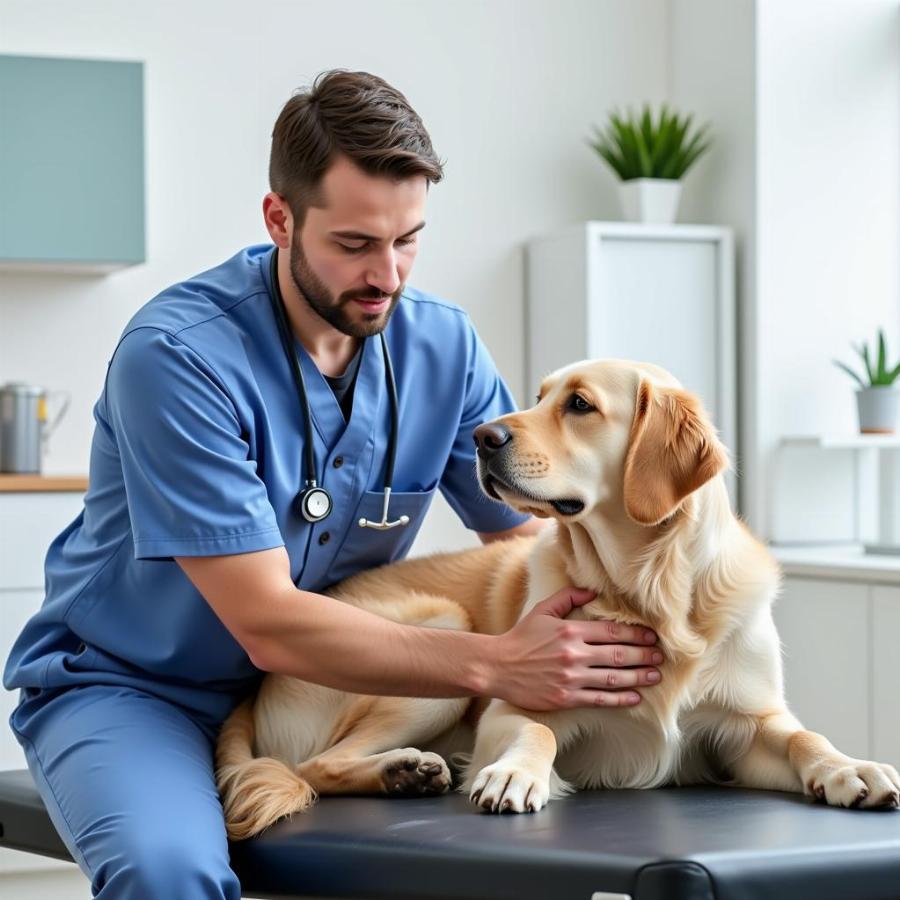Finding mucus in your dog’s poop can be alarming, but don’t panic just yet. While it’s not always a cause for major concern, it’s definitely something worth paying attention to. This article will guide you through the possible reasons why your furry friend might have mucus in their stool, when it’s time to visit the vet, and how to keep your dog happy and healthy.
Common Causes of Mucus in Dog Poop
Let’s face it, examining your dog’s poop isn’t the most glamorous part of being a pet parent. But, it can provide valuable insights into their health. A little mucus in your dog’s poop might be completely normal, but excessive amounts, or changes in color and consistency, can indicate an underlying issue.
Here are some common culprits behind that slimy substance in your dog’s poop:
- Dietary Indiscretion: We’ve all been there. You turn your back for a second, and your dog has gobbled down something they shouldn’t have. This scavenging behavior can upset their stomach and lead to mucus in their poop.
- Stress or Anxiety: Just like humans, dogs can experience stress and anxiety, which can manifest physically. A sudden change in routine, a new pet in the house, or even loud noises can trigger digestive upset and result in mucus in their stool.
- Parasites: Intestinal parasites, such as roundworms, hookworms, and whipworms, can irritate your dog’s gut lining, leading to inflammation and increased mucus production.
- Inflammatory Bowel Disease (IBD): IBD is a chronic condition that affects the digestive tract, causing inflammation and excess mucus production.
- Food Allergies or Intolerances: Just like us, dogs can have sensitivities to certain foods. If your dog is consistently producing mucus-laden poop, a food allergy or intolerance could be the culprit.
When to Worry: Red Flags to Watch Out For
While a little mucus in your dog’s poop is often nothing to worry about, there are times when it’s crucial to seek veterinary attention. If you notice any of the following symptoms alongside mucus in their stool, contact your veterinarian immediately:
- Blood in stool (blood in dog feces)
- Frequent diarrhea or vomiting (dog clear vomit)
- Lethargy or weakness
- Loss of appetite
- Weight loss
- Straining to defecate
- Abdominal pain
“It’s always better to be safe than sorry,” says Dr. Emily Parker, a veterinarian with over 15 years of experience. “If you notice any changes in your dog’s poop, especially accompanied by other symptoms, it’s best to consult with your veterinarian to rule out any serious health concerns.”
Diagnosing the Cause: What to Expect at the Vet
If your dog’s symptoms warrant a trip to the vet, be prepared to answer questions about their diet, any recent changes in their routine, and their overall health history. The veterinarian will likely perform a physical examination and may recommend one or more of the following tests:
- Fecal Exam: This test helps identify the presence of parasites in your dog’s stool.
- Blood tests: Blood work can help assess organ function and check for signs of infection or inflammation.
- Abdominal X-rays or Ultrasound: These imaging tests can help visualize the digestive tract and identify any abnormalities.
- Endoscopy or Biopsy: In some cases, a more invasive procedure, such as endoscopy or biopsy, may be necessary to obtain a definitive diagnosis.
 Veterinarian Examining Dog with Stethoscope
Veterinarian Examining Dog with Stethoscope
Keeping Your Dog Healthy: Tips for Prevention
Prevention is always better than cure. Here are some proactive measures you can take to minimize the chances of your furry friend experiencing mucus in their poop:
- Feed a High-Quality Diet: Choose a yellow dog food bag that contains high-quality ingredients and is specifically formulated for your dog’s breed, age, and activity level.
- Prevent Scavenging: Keep your home free of potential hazards and discourage your dog from eating things they shouldn’t.
- Regular Deworming: Follow your veterinarian’s recommendations for regular deworming to prevent parasitic infections.
- Manage Stress and Anxiety: Provide a safe and enriching environment for your dog and incorporate stress-reducing activities into their routine.
Conclusion
Finding mucus in your dog’s poop can be concerning, but it’s not always a reason to hit the panic button. By understanding the common causes, knowing when to seek veterinary care, and taking proactive steps for prevention, you can help keep your canine companion happy and healthy. Remember, when in doubt, always consult with your veterinarian for personalized advice and guidance.
Need more help understanding why is my dog’s poop mucus? Contact Beaut Dogs at [email protected] for detailed and accurate information.
Beaut Dogs is your go-to resource for all things dog-related, providing trustworthy and in-depth information about the canine world. We offer a wealth of knowledge on various dog breeds, their characteristics, personalities, and care requirements. Visit us today to explore the wonderful world of dogs and learn how to care for them!